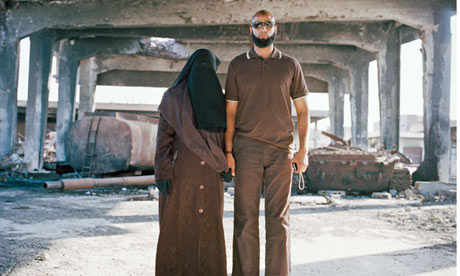Luke Harding The Guardian, Monday 29 October 2012 20.00 GMT
Photojournalist Louis Quail visited post-revolution Libya this summer, just before its first election since 1965. His images show a country in search of its future
Newlyweds, Bader Dahar Madie with wife Sara on their honeymoon exploring Mistrata. Photograph: Louis Quail
A year after the violent death of Muammar Gaddafi, debate still rages about Libya's 2011 revolution. Was it worth it? Or will Gaddafi's overthrow lead to a second Iraq? Optimists say that despite the recent murder of the US ambassador in Benghazi, Libya could in time be a success story. For the pessimists, though, the country is already a mess: the central government is weak; armed militias roam with impunity; fighting resumed this month around the loyalist town of Bani Walid. In the east of the country is the spectre of radical Islam.
In a series of extraordinary portraits from the new Libya, the photojournalist Louis Quail sets out to provide some answers. His starting points are Libyans themselves – the taxi-driver who joined the revolution and photographed Gaddafi's dying moments on his iPhone; a mother grieving for her martyred son; a honeymoon couple visiting Misrata, one of the bastions of resistance to the regime, the bride decked out in a full concealing veil. There is a female politician from Benghazi and a group of brave women from a Tripoli suburb who handed out anti-Gaddafi fliers – an act of resistance punishable by imprisonment and rape.
Quail's conclusions are surprisingly affirming. Despite the deaths of loved ones – sons, brothers, cousins, friends – Libyans remain hopeful that their country can be a better place, and that the revolutionary idealism of 2011 can prevail. The challenge, they recognise, is to unlearn old mental habits: "Within many Libyan brains you will find a mini Gaddafi," one Libyan tells Quail, acknowledging the legacies of 42 years of dictatorship. He adds: "He is still in our subconscious. I feel it's going to get better but we need time, a long time."
Quail visited Libya for three weeks in June, just before the country's first election since 1965. (The poll delivered victory for moderates rather than Islamists, but the subsequent political process has partly broken down.) He says he set out to shoot pictures that were "more reflective" and "quieter" than typical news images. He has two favourites. One is of a woman, Marim al Bosafi, whose son Hamsa was shot dead in September 2011. She has kept his room the same: "She goes up there every day, touches and smells his things … Nobody can replace the boy-sized hole left in that woman's heart. You can see a soft toy in the corner he had as a boy."
The other is of a rebel soldier with a gun in his hand.
To his credit, Quail also sought out the revolution's losers. He talked to imprisoned Gaddafi fighters. He recorded the spot where many had died. And he travelled to Tawerga, a Gaddafi-loyalist town just down the road from revolutionary Misrata. After the fall of Tripoli, rebels burned down all of Tawerga's houses, forcing those left behind to flee. A photo shows a rusting car in an alley of abandoned houses – a strange urban landscape bereft of life. The rebels knew this violence was wrong. But they were unable to stop themselves; one wrote on a wall: "Sorry Osama [the local leader] I couldn't control myself."
Gaddafi's overthrow, of course, was only possible because of Nato's assistance: UK and French warplanes bombed his troops, and last October targeted his convoy, forcing him to seek refuge in a storm drain. It was from here that he was captured, beaten and shot. Quail says most Libyans are grateful for Nato's help, and adds that without it the country would be "the same as Syria", in the grip of an inconclusive and murderous civil war. He adds that most of those whom he met were "very moderate Muslims". "They were so courageous … In Misrata I came across dentists, lawyers, who had taught themselves how to fight. At the end of the day they went out to protect their families as much as anything."
• Libya: Murder in Benghazi and the Fall of Gaddafi by Martin Chulov and Luke Harding is published this week as an ebook by Guardian Books, price £2.99.
Portraits of Libya after Gaddafi | World news | The Guardian

